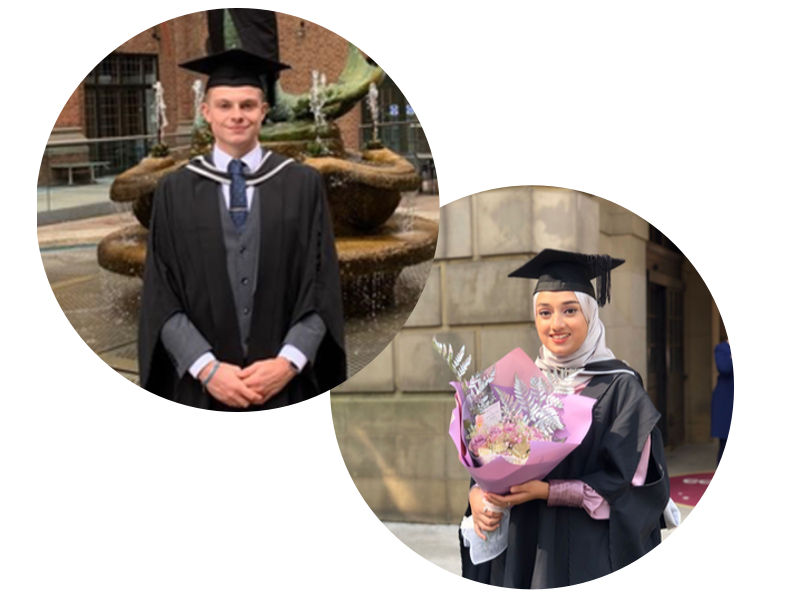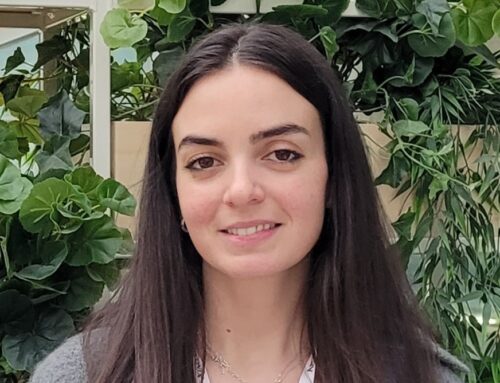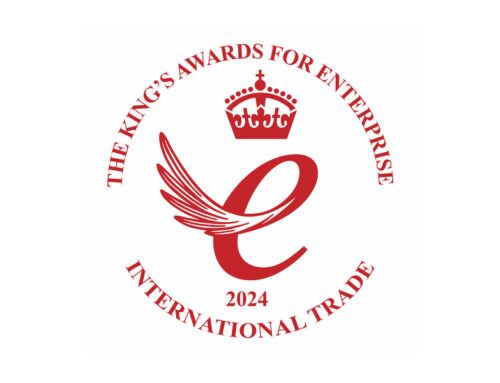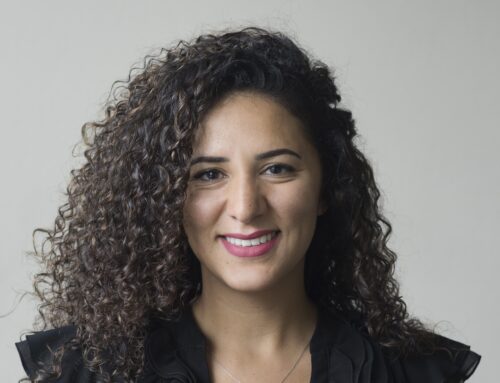ApconiX Celebrates the Success of Two of Our Project Students

ApconiX supervised two final year first degree students from the University of Birmingham this past academic year and caught up with them after their graduation. Edward Withnall and Tahera Yasmin were both supervised by Dr Sean Hammond, Immunotoxicology Lead. Both projects form part of an in-house ongoing translational research project on preclinical and clinical aspects of immune-related adverse events (irAEs) seen with immune oncology drugs.
Edward Withnall
Edward studied for a BSc in Human Biology. Edward has always had an interest in oncology and immunology, so this final year project was an excellent match. Initially thinking about studying medicine until he realised, he really wasn’t suited to cutting people open, Edward was still interested in pursuing a career in the biology and medicines in general.
Edward’s project was a literature study into how well experimental models correlated to observations in human clinical trials with immunomodulatory therapeutics, titled “Are Models of Autoinflammatory Disease a Potential Tool in Target Safety Evaluation of Immunomodulatory drugs”. Using the non-obese diabetic model, Edward investigated the frequency of the symptoms of type 1 diabetes as a form of preclinical immune-related adverse event.
“The project suited my interests, and I did really enjoy it. I have to say it took a few months to get the project off the ground but once I’d worked out the complex science involved, it was great. There were challenges particularly because the irAE I studied was so rare. It was difficult finding relevant papers which took some perseverance.” Commented Edward
Edward added, “There were great learnings from the project; not least start early! One of the other really useful lessons was how to refine searches in PubMed. An example was learning how to use Boolean operators within searches which made the number of papers returned so much smaller and so much easier to go through. Overall, the fact that the project was a real-world problem made the research more enjoyable. There were lots of discussions with Sean about which direction the project should take, and we had to adapt going forward. I had never done that type of work before. Researching and refining literature and re-interpreting it. Totally different from laboratory work.”
Edward is continuing at the University of Birmingham and will be studying for a MSc in Immunology and Immunotherapy. Thinking about the future, Edward may well stay in academic research and go on to do a PhD or may look to enter the industrial world. Avenues of interest include pharmaceutical industry and clinical sciences in the NHS, hoping staying in immunology and/or cancer research particularly appeal.
Tahera Yasmin
Tahera studied for a BSc in Biochemistry and much preferred the biological side of her degree. She was also keen on the medical side of things but not direct patient care. Tahera originally thought she’d pursue a career in epigenetics but following a 4 week placement at Sosei Heptares which included immunology, Tahera realised she was far more interested in the immunology.
Tahera’s project was titled “The Safety of Immune Checkpoint Inhibitors in Relation to the Gastrointestinal System”. Tahera also looked at the safety of immune checkpoint inhibitors (ICI) but focused on investigating the gastrointestinal system. Her work involved investigation of experimental models of DSS-induced colitis. IrAE’s related to colitis were more common and Tahera found it easier create a grading system to compare different ICIs.
Tahera enjoyed her project the most of all her final year modules. “My friends would smile as I would be working on my dissertation in my spare time,” laughed Tahera.
Working with an industrial partner was particularly helpful. “Sean was very contactable and happy to talk through the project. Having an external contact and coming to visit ApconiX was very valuable.”
“This type of project doesn’t fall into place until you’ve started collating some background research and got to grips with the science. It was also difficult to fit the dissertation exactly to the formatting criteria of the University, but we got there eventually,” commented Tahera.
“Again, the training in targeted literature searches made a massive difference to the number of papers I had to sift through, and I told all my friends who were very grateful for the time saving advice. How science works in the real world was eye opening and the importance of data sharing. Understanding that research doesn’t fall into place until later and not to worry if the results aren’t what you expected were both great learnings. You follow the science and real science can be messy!” added Tahera.
Tahera is joining AstraZeneca down in Cambridge and will be carrying out research and development in immunology with a specific focus on target discovery in oncology. Tahera joins the graduate programme in September and will be carrying out laboratory research. Tahera may continue her academic studies and possibly gain a MSc and a PhD through the graduate programme.
Both Edward and Tahera came up to Alderley Park to present and discuss their project with the wider ApconiX team. “Meeting the ApconiX team and having to do a presentation, in person, in front of some very clever people was nerve racking but was very worthwhile- after that, I didn’t really stress about the formal assessment! Visiting the company really helped me move forward with the project more successfully,” commented Edward. “The questions from the ApconiX team were of a high order, and this was very good practice for the final dissertation. Everyone in ApconiX was very nice and friendly,” added Tahera.
Sean added a few final comments:
“The undergraduate honours research project can be a defining time in the degree for students. It’s usually the first opportunity they get to undertake their own research and join the scientific frontier. Tahera and Edward are very different personalities who share a genuine interest in the science. To meet the challenges of their respective and combined projects they’ve had to think critically, and work both hard and collaboratively. It has been a pleasure to supervise them at this step of their respective scientific journeys. I wish them every success as they go forward …. I’m also glad they’ve not been put off immunology!”
“As for the projects, these continue to develop and parts of these projects feed into the ever growing knowledge base of the target safety assessment team. We pride ourselves here at ApconiX that we expose students to the front line of real-world science, and that whilst this means the students may face difficult challenges during the projects, we will support them to develop their own skills to overcome such challenges.”
Tahera and Edward’s work was published in a poster presented at the BTS Discovery Toxicology conference at Alderley Park in June of this year. ApconiX has really enjoyed hosting their projects this year and wish them every success in their future careers.





